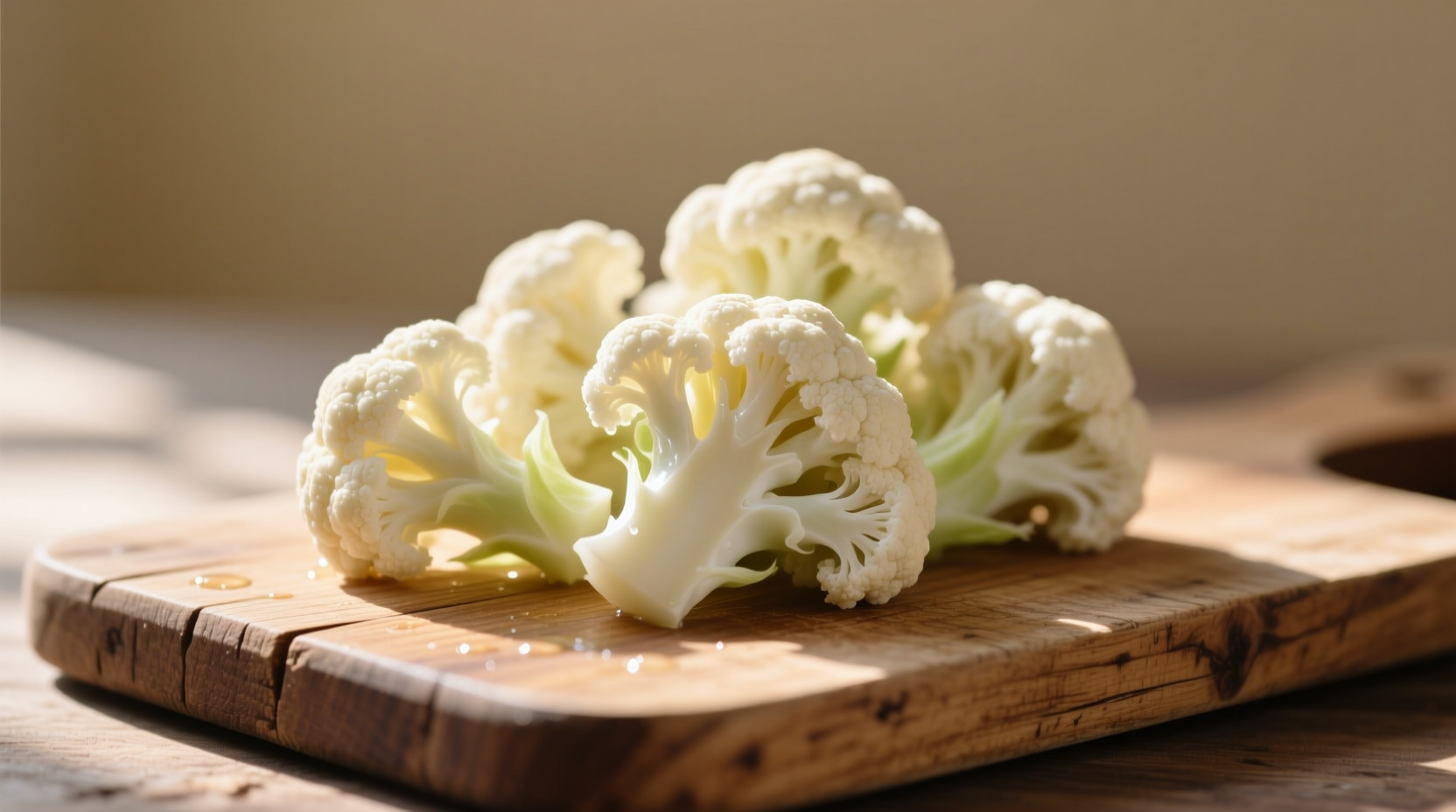When you're looking for a nutritional powerhouse that doesn't compromise on versatility, cauliflower stands out among vegetables. This humble member of the cruciferous family delivers an impressive array of health-promoting compounds that scientific research continues to validate. Unlike many trendy "superfoods," cauliflower has earned its place on health-conscious plates through substantial evidence of its benefits.
What Makes Cauliflower Nutritionally Unique
While many vegetables offer health benefits, cauliflower contains a distinctive combination of nutrients and phytochemicals that work synergistically. The USDA FoodData Central database confirms that one cup (100g) of raw cauliflower provides:
| Nutrient | Amount per Cup | Daily Value % |
|---|---|---|
| Calories | 25 | 1% |
| Vitamin C | 48.2mg | 77% |
| Vitamin K | 16.6mcg | 14% |
| Folate | 57mcg | 14% |
| Fiber | 2.5g | 9% |
| Potassium | 299mg | 6% |
What truly distinguishes cauliflower from many other vegetables is its rich concentration of glucosinolates—sulfur-containing compounds that transform into biologically active isothiocyanates like sulforaphane when chopped or chewed. These compounds activate the body's natural detoxification enzymes and have been extensively studied for their protective effects.

Science-Backed Health Benefits of Regular Consumption
Cancer Risk Reduction Potential
Research published in Cancer Prevention Research demonstrates that sulforaphane, abundant in cauliflower, helps regulate gene expression related to cancer development. A comprehensive review by the World Cancer Research Fund consistently identifies cruciferous vegetables like cauliflower as having probable protective effects against several cancers, particularly prostate and colorectal cancers. The mechanism involves enhancing the body's detoxification pathways and reducing oxidative stress at the cellular level.
Cardiovascular Protection
The American Heart Association recognizes cauliflower's contribution to heart health through multiple pathways. Its high vitamin K content supports proper blood clotting regulation, while the fiber helps manage cholesterol levels. Additionally, cauliflower contains indole-3-carbinol, which research in the Journal of Agricultural and Food Chemistry shows helps maintain healthy blood vessel function by reducing inflammation markers.
Digestive System Support
With 2.5 grams of fiber per serving, cauliflower promotes regular bowel movements and feeds beneficial gut bacteria. Unlike some high-fiber foods that cause discomfort, cauliflower's fiber profile combines both soluble and insoluble varieties, providing balanced digestive support. The National Institutes of Health notes that adequate fiber intake from sources like cauliflower correlates with reduced risk of diverticular disease and improved gut microbiome diversity.
Cauliflower vs. Other Vegetables: Where It Stands Out
While all vegetables contribute to health, cauliflower offers unique advantages in specific areas. This comparison highlights where cauliflower excels:
| Nutritional Aspect | Cauliflower Advantage | Competing Vegetables |
|---|---|---|
| Vitamin C Density | Higher per calorie than broccoli | Broccoli, bell peppers |
| Glucosinolate Profile | Unique combination of glucoraphanin and gluconasturtiin | Broccoli, kale |
| Carbohydrate Content | Lower net carbs than most starchy vegetables | Sweet potatoes, corn |
| Versatility | Can replace higher-calorie foods in multiple forms | Limited substitution options |
Maximizing Cauliflower's Health Benefits Through Preparation
How you prepare cauliflower significantly impacts its nutritional value. Research from the Journal of the Science of Food and Agriculture reveals that:
- Raw consumption preserves maximum vitamin C and enzyme activity but may reduce absorption of certain fat-soluble compounds
- Light steaming (5-7 minutes) increases the bioavailability of carotenoids while preserving glucosinolates better than boiling
- Roasting at moderate temperatures (375°F/190°C) enhances antioxidant capacity through the Maillard reaction
- Chopping and waiting 40 minutes before cooking allows myrosinase enzymes to fully activate beneficial compounds
For optimal nutrient retention, avoid overcooking cauliflower until it becomes mushy, which significantly reduces vitamin C content. Pairing cauliflower with healthy fats like olive oil improves absorption of fat-soluble phytochemicals.
When Cauliflower Might Not Be Ideal: Context Boundaries
While generally beneficial, cauliflower isn't appropriate for everyone in all circumstances. Understanding these context boundaries ensures you maximize benefits while avoiding potential issues:
- Thyroid concerns: People with existing thyroid conditions should moderate raw cauliflower intake, as excessive consumption of raw cruciferous vegetables may interfere with iodine absorption. Cooking reduces this effect significantly.
- Digestive sensitivities: Those with IBS or FODMAP sensitivities may experience bloating from cauliflower's raffinose content. Starting with small portions of well-cooked cauliflower can help determine tolerance.
- Medication interactions: The vitamin K content in cauliflower could potentially interact with blood thinners like warfarin. Consistent daily intake is more important than complete avoidance for those on these medications.
The National Institutes of Health recommends that most adults consume 2.5-3 cups of vegetables daily, with cruciferous vegetables like cauliflower comprising a significant portion of this recommendation for optimal health outcomes.
Practical Ways to Incorporate More Cauliflower
You don't need complicated recipes to enjoy cauliflower's benefits. Try these simple, evidence-based approaches:
- Rice substitute: Pulse raw cauliflower in a food processor for "cauliflower rice" that contains 80% fewer carbs than white rice
- Creamy sauces: Blend steamed cauliflower with garlic and nutritional yeast for a dairy-free Alfredo alternative
- Snack upgrade: Roast cauliflower florets with turmeric and black pepper for enhanced anti-inflammatory effects
- Smoothie booster: Add raw cauliflower to fruit smoothies—the mild flavor disappears while boosting nutrient density
These preparation methods maintain cauliflower's nutritional integrity while making it appealing to even the most vegetable-averse eaters. The key is preserving as much of the raw vegetable's structure as possible to protect heat-sensitive compounds.
Conclusion: Why Cauliflower Deserves Regular Rotation
Cauliflower's combination of nutrient density, bioactive compounds, and culinary versatility makes it a standout vegetable for health-conscious eating. Unlike many nutrition trends that come and go, cauliflower's benefits are supported by decades of nutritional research and traditional culinary use across multiple cultures. By understanding how to select, prepare, and incorporate cauliflower into your regular diet, you can harness its full potential for supporting long-term health and wellness.











 浙公网安备
33010002000092号
浙公网安备
33010002000092号 浙B2-20120091-4
浙B2-20120091-4